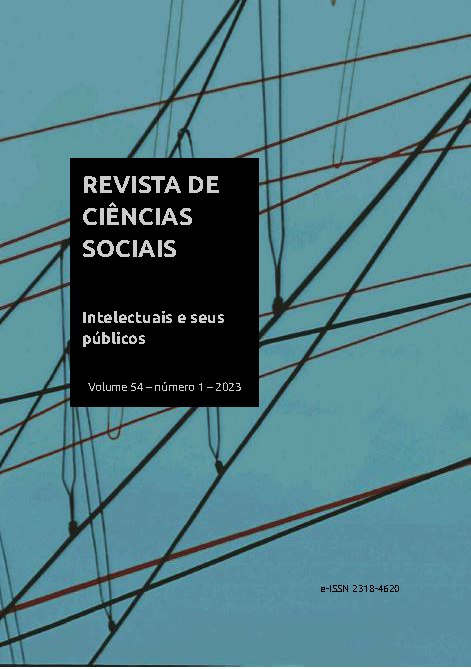The rise of the extreme right and the challenges to the democratic rule of law in Brazil (2018-2022)
DOI:
https://doi.org/10.36517/rcs.54.1.a06Keywords:
Extreme right, Bolsonarism, Democracy, Populism, Political crisisAbstract
This paper aims to understand the reasons that led to the rise of the current extreme right, from a populist and authoritarian matrix, to power in Brazil, and the impacts on the democratic rule of law. The work consisted of a descriptive and comprehensive research based on a systematic observation and analysis of the most recent facts of the Brazilian political experience based on data extracted from newspapers, magazines, websites, internet channels, documentation from public and judicial bodies and entities and news broadcasts. It was discussed how such a rise has negatively and threateningly impacted the main institutions of the democratic rule of law in the country in charge of the dominant social classes, with harmful sacrifices of the traditional social public agenda. This reality is reproduced from of an authoritarian populism, under the Bolsonaro government, with its due specificities.This article aims to analyze the rise of a extreme right policy in Brazil, from bolsonarism and the election of Bolsonaro in 2018, highlighting its empirical evidence and the impacts on the democratic rule of law. In view of this, the work was guided by the following synthesis question: what are the impacts of the rise of the extreme right, from bolsonarism and the election of Bolsonaro, on the democratic state of law in Brazil? In search of answers, we focused theoretically and conceptually about the “extreme right” category, based on the authors who directly and opportunely dealt with the subject, which is why they are part of the theoretical basis of reflection on the current Brazilian political reality. From a dialectical approach, we bring together evidences from the current political scenario, as a result of the confrontation between our observations and the different analyses by authors that dedicate their studies on a new right policy in Brazil contemporary. The work consists of a descriptive research and political comprehension, starting from a systematic observation and analysis of most recent data from newspapers, magazines, websites, internet channels, broadcast on television news. The research revealed that the rise of the extreme right, marked by authoritarian populism, under the Bolsonaro government, with its due specificities, negatively impacted the main institutions of the democratic rule of law in the country, in charge of the dominant social classes, with threats to the legal order, attacks on human rights and citizenship, with deleterious effects on the social inclusion agenda.
References
ADORNO, Theodor W. Aspectos do novo radicalismo de direita. Tradução de Felipe Catalani. São Paulo: Editora Unesp, 2020.
AVRITZER, Leonardo; KERCHE, Fábio; MARONA, Marjorie. Governo Bolsonaro: retrocesso democrático e degradação política. Belo Horizonte: Autêntica, 2021.
BOBBIO, Norberto. Direita e esquerda: razões e significados de uma distinção política. 3.ed. São Paulo: Unesp, 2011.
______. Liberalismo e democracia. São Paulo: Edipro, 2017.
CARVALHO, Luiz Maklouf. O cadete e o capitão. São Paulo: Todavia, 2019.
GIDDENS, Anthony. Para além da esquerda e da direita. São Paulo: Unesp, 1996.
GIDDENS, Anthony.. A terceira via. Rio de Janeiro, Record, 1999.
GRAMSCI, Antonio. Concepção dialética da história. Tradução de Carlos Nelson Coutinho. 3.ed. Rio de Janeiro: Civilização Brasileira, 1978. p. 52.
JINKINGS, Ivana; DORIA, Kim; CLETO, Murilo (Orgs.). Por que gritamos golpe? Para entender o impeachment e a crise política no Brasil. São Paulo: Boitempo, 2016.
MADEIRO, Carlos. Mais miséria, mais fome: 2 milhões de famílias caíram na extrema pobreza durante o governo Bolsonaro. Universo On Line (UOL). 26 set. 2021. <https://noticias.uol.com.br/reportagens-especiais/mais-miseria-mais-fome/>. Acesso em: 27 set. 2021.
MARTINS, José de Souza. Do PT das lutas sociais ao PT do poder. São Paulo: Contexto, 2016.
MBEMBE, Achille. Necropolítica. 3. ed. São Paulo: n-1 Edições, 2018.
PRONER, Carol et al. (Orgs.) A resistência ao golpe de 2016. Bauru: Canal 6, 2016.
PRZEWORSKI, Adam. Capitalismo e social-democracia. São Paulo: Companhia das Letras, 1989.
ROCHA, Camila; SOLANO, Esther. A ascensão de Bolsonaro e as classes populares. In: AVRITZER, Leonardo; KERCHE, Fábio; MARONA, Marjorie. Governo Bolsonaro: retrocesso democrático e degradação política. Belo Horizonte: Autêntica, 2021.
SOUZA, Jessé. A radiografia do golpe. Rio de Janeiro: LeYa, 2016.
TAVARES, Joelmir. Busca de 3ª via une nos bastidores ex-miss e raposas políticas que querem opção a Bolsonaro e Lula. Folha de São Paulo, São Paulo, 21 ago. 2021. Disponível em: <https://www1.folha.uol.com.br/poder/2021/08/busca-de-3a-via-une-nos-bastidores-ex-miss-e-raposas-politicas-que-querem-opcao-a-bolsonaro-e-lula.shtml>. Acesso em: 21 ago. 2021.
TORMEY, Simon. Populismo: uma introdução concisa. Tradução de Mário Molina. São Paulo: Cultrix, 2019. E-book.
Downloads
Published
How to Cite
Issue
Section
License
Autores que publicam nesta revista concordam com os seguintes termos:- Autores mantém os direitos autorais e concedem à revista o direito de primeira publicação, com o trabalho simultaneamente licenciado sob a Creative Commons Attribution License, que permite o compartilhamento do trabalho com reconhecimento da autoria do trabalho e publicação inicial nesta revista.
- Autores têm autorização para assumir contratos adicionais separadamente, para distribuição não-exclusiva da versão do trabalho publicada nesta revista (ex.: publicar em repositório institucional ou como capítulo de livro), com reconhecimento de autoria e publicação inicial nesta revista.
- Autores têm permissão e são estimulados a publicar e distribuir seu trabalho online (ex.: em repositórios institucionais ou na sua página pessoal) a qualquer ponto antes ou durante o processo editorial, já que isso pode gerar alterações produtivas, bem como aumentar o impacto e a citação do trabalho publicado (Veja O Efeito do Acesso Livre).



